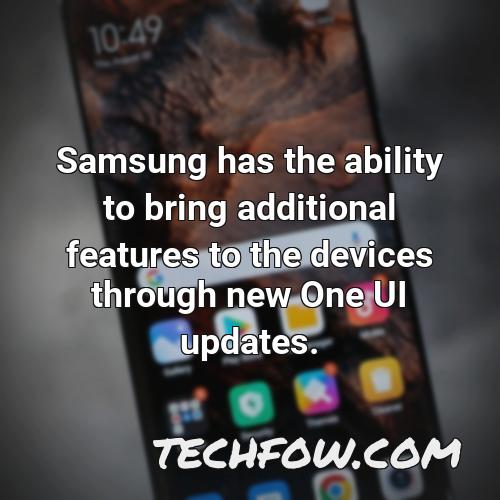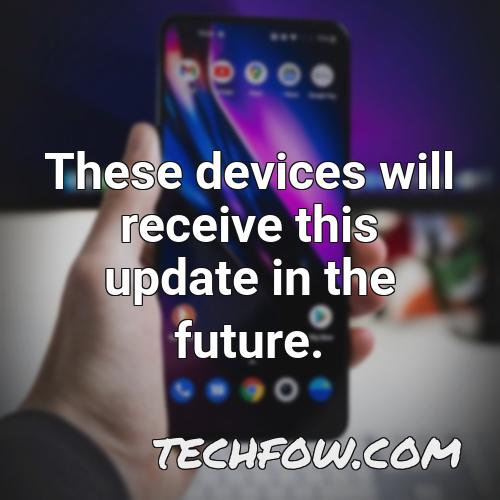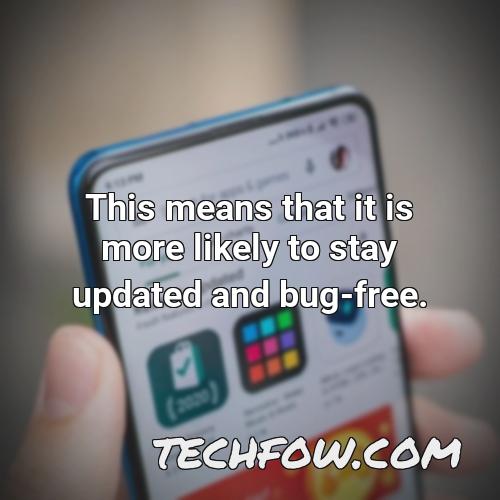Samsung has announced that the Galaxy S9 and Galaxy S9+ will get Android 10. This new version of Android has a number of enhancements that make the Galaxy S9 series more user-friendly. For example, the expanded dark mode makes it easier to use the phone in low light conditions, while less obtrusive notifications mean you won’t be constantly interrupted. And with Digital Wellbeing, you can manage your phone’s battery and data usage in one place. Android 10 is already available on a number of devices, so if you’re planning to upgrade your Galaxy S9 or Galaxy S9+ to the newest version of Android, now is the time.
You need to know this
Android 10 is the next major update for Android. It is expected to be released in the fall of 2019. Android 10 will include new features, improvements, and changes. Some of the new features include:
-A new system that will allow users to manage their battery life more efficiently.
-A new system that will allow users to manage their notifications more efficiently.
-A new system that will allow users to manage their apps more efficiently.

Does S9 Support Android 10
Samsung releases Android updates to their Galaxy S9 and Galaxy S9+ every three months. The most recent update, Android 10, was released in October. As of now, Samsung does not plan to release an update for the Galaxy S9+ that will support Android 10. This means that the Galaxy S9+ will not be able to use all of the new features and improvements that were introduced in Android 10.

How Can I Update My S9 to Android 10
If your Samsung Galaxy S9 is running Android 8.0 Oreo, you can update to Android 10.0 P in the same way as you would update to Android 8.0 Oreo. Make sure your device is fully charged and connected to Wi-Fi. Swipe down from the Notification bar and tap Settings. Scroll to and tap Software update, then Check for updates. Follow the on-screen prompts to download and install the update.

What Operating System Does the Galaxy S9 Have
-
The Galaxy S9 and Galaxy S9+ come with Android 8.0 out of the box.
-
The Galaxy S9 and Galaxy S9+ have since received their Android 9.0 and Android 10 updates.
-
Samsung has the ability to bring additional features to the devices through new One UI updates.
-
The Galaxy S9 and Galaxy S9+ will not receive another major Android OS upgrade.
-
However, Samsung does have the ability to bring additional features to the devices through new One UI updates.
-
The Galaxy S9 and Galaxy S9+ are available in the United States.
-
The Galaxy S9 and Galaxy S9+ have a price tag of $720 and $839, respectively.

Does Galaxy S10 Still Get Updates
The Galaxy S10 series still receives updates, but it’s unclear if Android 12 will be the last update for this series. Android 13 is set to be the next major update for the Galaxy S20, S20 Plus, S20 Ultra, and S20 FE series. These devices will receive this update in the future.

Whats the Difference Between Android 11 and 12
Android 11 is the newest update to the Android operating system. It was released in December 2018 and is designed for users who want a more customizable experience. Android 12 is the next update to the Android operating system and was released in November 2019. It has a heavier focus on performance and privacy than Android 11.
One of the main differences between Android 11 and Android 12 is that Android 12 is more customizable and personalized for you. This means that it has a heavier focus on performance and privacy than Android 11. Android 12 also has a new design that is more focused on performance and privacy.
One of the main benefits of Android 12 is that it has a more stable and fast operating system. This means that it is more likely to stay updated and bug-free. Android 12 also has a new feature called ‘Digital Well-being’. This feature allows you to track and manage your privacy and performance settings.
Overall, Android 12 is a more customizable and privacy-focused update to the Android operating system. It is likely to be more stable and faster than Android 11 and is designed for users who want a more customizable and personalized experience.

How Do I Install Firmware on Samsung Galaxy S9 Plus
To install firmware on your Samsung Galaxy S9 Plus, you will need to first connect the phone to the computer. Once connected, you will need to turn the phone into Download Mode. This can be done by pressing and holding the Volume Down and Power buttons at the same time. Once in Download Mode, you can proceed to Odin. Odin is a program that can be used to install firmware onto the phone. To use Odin, you will need to have Samsung drivers installed on the computer. Once you have installed Samsung drivers, you can proceed to Odin. In Odin, you will need to first check to see if the phone is compatible with the firmware you are trying to install. This can be done by clicking the check box next to the firmware file. Once the phone is compatible, you will need to click the AP button in Odin. This will load the Android P firmware onto the phone. Once the firmware is loaded, you will need to click the start button in Odin. This will start the firmware installation process. Once the installation process is complete, you will need to reboot the phone.

Are Android Security Updates Important
Android devices are constantly being attacked by hackers, but that doesn’t mean you don’t need to keep your device secure. In fact, Android devices are just as vulnerable to hacks as any other device. However, because Android devices are used by so many people, manufacturers are constantly releasing updates to patch security vulnerabilities.
Security updates are important for a few reasons. First, they protect your device from attacks. Second, they help to improve the security of the Android operating system. Finally, they protect you from potential data breaches.
If you don’t keep your Android device updated, you are opening yourself up to potential security risks. Not only could your device be vulnerable to attacks, but your personal data could also be compromised.
Keep in mind that not all Android devices are created equal. Some devices are more vulnerable to security breaches than others. If you have an older Android device, you may want to consider upgrading to a newer model.
Security updates are a must-have for Android devices. They not only protect your device from attacks, but they also help to improve the security of the Android operating system. If you don’t keep your Android device updated, you are opening yourself up to potential security risks. Not only could your device be vulnerable to attacks, but your personal data could also be compromised.

Is Samsung S9 Still Secure
Samsung has removed the Galaxy S9 series from its mobile security page, meaning that they won’t be receiving any security updates anymore. This marks the end of a glorious four-year run for the Galaxy S9 and S9 Plus. While this may be a disappointment for some, it is important to remember that security updates are not the only factor that affects the security of a device. Other factors such as the operating system, the device’s security settings, and the user’s habits also play a role. So, while the Galaxy S9 and S9 Plus may not be getting the latest and greatest security updates anymore, they are still very secure devices.

Is Galaxy 9 a Good Phone
The Galaxy S9 is a phone that is very similar to the Galaxy S8. It has a design that is similar and the screen is very similar. One improvement that was needed was better biometrics, and the camera was improved significantly. However, there are some sacrifices made, such as in the low light capabilities. Overall, the Galaxy S9 is a good phone, but it may not be the best phone out there.
Which Is Latest Samsung Phone
The Samsung Galaxy S22 Ultra is the latest phone from Samsung and it is a great phone. It has a lot of features and is a great phone to use. It has a 5G connection which is great and it is a great phone to use. It is a great phone to use and is the latest phone from Samsung. It is a great phone to use and is the latest phone from Samsung. It is a great phone to use and is a great phone to use.
Will Galaxy S9 Get Android 11
According to Samsung, the Galaxy S9 and Galaxy S9+ no longer receive updates to newer versions of Android, including Android 11 and Android 12. This means that these devices will not be able to take advantage of new features and improvements that these versions of Android offer. This is a disappointing development, as the newer versions of Android offer a variety of new features and improvements that could be useful on these devices.
Conclusion
So, the Galaxy S9 and Galaxy S9+ will get Android 10 when it is released later this year. This new version of Android has a number of enhancements that make the phone more user-friendly, including an expanded dark mode and less obtrusive notifications. With Digital Wellbeing, you can manage your phone’s battery and data usage in one place. Android 10 is already available on a number of devices, so if you’re planning to upgrade your Galaxy S9 or Galaxy S9+ to the newest version of Android, now is the time.

